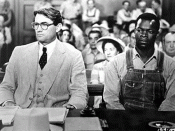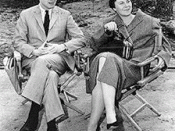Steiner 1
Drew Steiner
Ms. Peyton-Corbin
English Period G
TKAM Essay
Harper Lee's To Kill a Mockingbird highlights examples of heroism and courage in a small Alabama town plagued with racism and poverty. The novel focuses on the experiences of the Finch family which consists of Atticus, Jem, and Scout. Scout serves as the narrator of the book; her story is based on her recollections of the events leading up to, during, and after her father's defense of Tom Robinson, a black man accused of raping Mayell Ewell, a white woman. To Kill a Mockingbird is not only a critique of racism, but teaches valuable life lessons about moral courage and standing up for what is right.
The protagonist, Atticus, displays both moral and physical courage throughout the novel. He is committed to instilling in his children the importance of living an ethical lifestyle regardless of the circumstances.
For example, he explains to Scout that he accepted the Tom Robinson case because it is a moral obligation for equal representation. Specifically, he clarifies to Scout that the primary reason is " if I didn't I couldn't hold up my head in town, I couldn't represent this county in the legislature, I couldn't even tell you or Jem not to do something again" (Lee 83). Atticus believes that it is only fair to judge one in terms of that individual's moral caliber not by the color of their skin. Furthermore, he does not condone retaliation. Even though Mrs. Dubose, a morphine addict, is prejudice and unkind, Atticus reprimands Jem for behaving heartlessly towards her. Atticus never loses his composure even when Bob Ewell maliciously spits in his face. He rationally explains, "He had to take it out on somebody and I'd rather it be me than that houseful...


